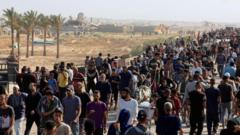Recent Israeli airstrikes in Lebanon have escalated tensions, causing significant casualties and threatening the fragile peace in the region.
Israeli Airstrikes Claim 12 Lives in Lebanon's Bekaa Valley Amid Rising Tensions

Israeli Airstrikes Claim 12 Lives in Lebanon's Bekaa Valley Amid Rising Tensions
Israeli military actions in Lebanon result in fatalities, raising alarms about ceasefire violations and the potential for renewed conflict.
At least 12 individuals have been reported killed following Israeli airstrikes targeting military installations linked to Hezbollah in Lebanon's eastern Bekaa Valley, according to regional governor Bachir Khodr. The casualties include seven Syrians, among them a family of five, and three Lebanese victims from the Wadi Faara area, with an additional two deaths recorded in Shmustar. This incident marks the deadliest military engagement in the region since the recent ceasefire concluded a protracted conflict between Israel and Hezbollah, which saw intense hostilities, including a two-month period of all-out war that left the militant group significantly weakened.
The Israeli military confirmed the strikes aimed at various military compounds belonging to Hezbollah, including facilities associated with its elite Radwan Force. The IDF spokesperson, Lt Col Avichay Adraee, stated via social media that the military actions targeted infrastructure utilized by terrorist operatives and secured combat equipment. These strikes have stirred fears of renewed conflict, especially as Hezbollah has yet to issue a formal response. However, its channel, Al-Manar, characterized the attacks as violations of the established ceasefire and Lebanese sovereignty.
Amid the escalating violence, Israeli Defense Minister Israel Katz emphasized that the military responses served to convey a "clear message" to both Hezbollah and the Lebanese government. Katz reiterated Israel's readiness to take formidable action against attempts to strengthen Hezbollah's military presence. Tensions have been re-ignited over issues surrounding the implementation of UN Security Council resolution 1701, which concluded the last major confrontation in 2006 and mandated the withdrawal of armed groups from southern Lebanon while delineating the roles of UN peacekeepers.
The current situation underscores the delicate balance of power in the region and poses new challenges to the already strained peace agreement, calling into question the future stability of Lebanon and its relationships with its neighbors.


















